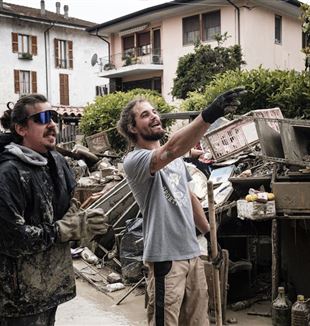
Flooding: signs of hope for life
Davide Prosperi's letter to "Corriere della Sera," after visiting communities in Emilia-Romagna.Dear Editor,
A few days ago I went to visit some friends who have been hit by the floods, and I would like to share what I have learned from them and with them. This is not the first time that nature overwhelms us and makes us experience our helplessness. It happened to us with the earthquake, with Covid, and now with the mud and water that have devastated many areas of Emilia-Romagna. Everyone carries what happened in their eyes: the mud engulfing everything, the dead, the people evacuated, the houses without electricity, the flooded fields, the destroyed farms, the water carrying everything away.
After the fear and bewilderment, however, we were surprised by the industriousness and generosity of hundreds and hundreds of people who set out to help those in need. Some opened their homes to evacuees, some cooked whole days for volunteers who rushed to shovel, some came from far and wide to lend a hand. A spectacle of a people that the media rightly described, because it is great the expression of a humanity that expends itself in response to the cry of those in need (perhaps your neighbor with whom until the day before you were arguing over trivial things). So many friends living there these days were faced with a disaster immensely greater than themselves, yet they did not lose heart. They speak of a gratuitousness that breaks the measure of their own calculation because it was unexpected and undeserved.
One of them, after his house was cleared of the bulk of water and debris, surprised me by saying he did not want to repaint right away. The marks on the walls left by the water, he says, will remind him tomorrow of what happened. But be careful: he explains to me that it will not remind him of the enormous damage done, it will not remind him of the evil of the violent face of nature, but of the good received. After all, how can one not wish for the rush of solidarity to never fade? And who would not want to continue to feel useful, loved and supported as in these hours? Is it not a thousand times nicer to always live in a companionship made up of men and women who shovel, cook, hug, support, cry with you and smile with you? But when the flood is over, and things slowly return to normal, what will be left of this good impetus? Here arises, already a few hours after the disaster, not only the righteous need to understand what happened and why, but also the temptation of doubt, suspicion, dry recrimination. This is a possible feeling, which makes the heart harder than the encrusted mud. And that makes one find oneself, as is often the case today, fundamentally alone.
To avoid only remaining with the simple memory of a few days difficult but full of affection when life returns to normal, but rather to ensure that what has been experienced to sustain life, we need the courage to take an extra step, to make a judgment about what has happened. Not in retrospect, when things are more or less in order, but now. Now that the water is still there to remind us that we are not masters of our lives, pulverizing our obsessions over our performance at work, in our family, on social media, with friends. What happened made it clear that we are not masters of anything, and at the same time that our hearts need much more than the things we own. Therefore, when they are ripped from our hands in a mysteriously painful way, dormant questions resurface: what gives life meaning? Why is it worth getting up in the morning? What makes us happy? Just a nice clean house, a career, designer shoes, a perfect physique?
Read also - The "caress" in the darkness of a garage
I wondered then, along with friends busy saving their homes and with their boots still dirty, how the questions about the meaning of life that the flood reawakened might not fall into nothingness. A beginning of an answer has the unassailable simplicity of this particular hour: remaining attentive to the concrete signs that reality puts before us, starting with every kind gesture received and not taken for granted. I was told that Fr. Giussani once gave this example: when you are driving in the fog and everything is blurred, while being certain that the road will take you to your destination, you are much more attentive to the signs (a sign, a light, a turn) in order not to lose your way. Thus, in these trying times, we sharpen our attention towards the signs. One should learn to live this way all the time. I think of how many people, perhaps strangers, have been a sign to those who were immersed in anger and pain. And even we, perhaps, have been a sign for others. We may lose our homes and fields, but not our hearts. And there is a way to keep it alive: to continually educate our gaze (and the flood is teaching us that the first education is the presence of friends whom we unexpectedly find to be fellow companions) so that our humanity does not harden like mud. And I am talking about our whole humanity, with its greatness and its smallness. Often we perceive our limits and our resistance as an obstacle to the advancement of this good, and yet, but just as resistance is a necessary condition for the spread of light in a light bulb, our humanity becomes the means for the spread of a light that is not our own in the world, a sign of something greater than ourselves. As McCarthy writes in his latest novel, "divine goodness appeared in strange places. Don’t keep your eyes closed."
Translated from corriere.it